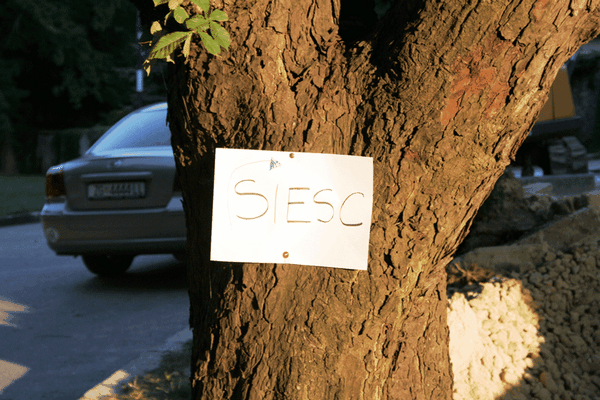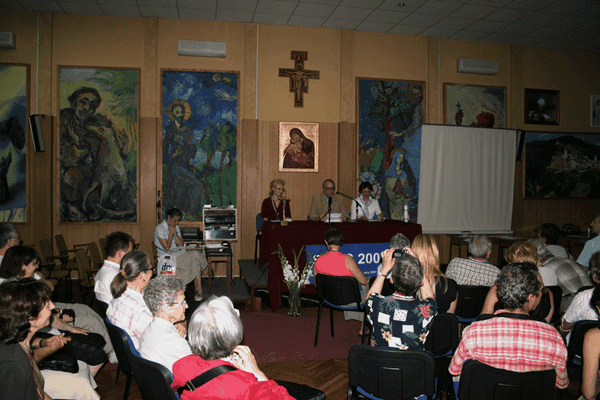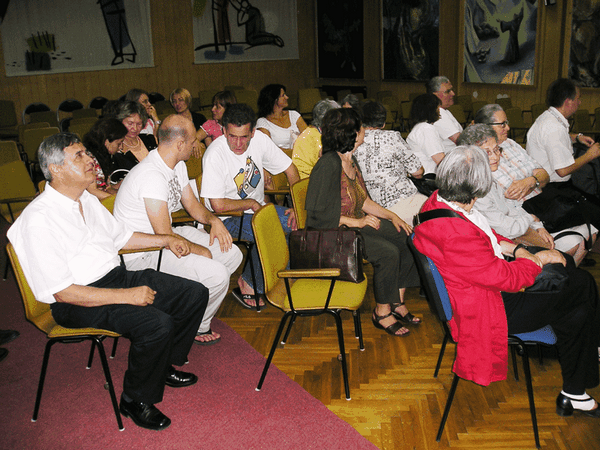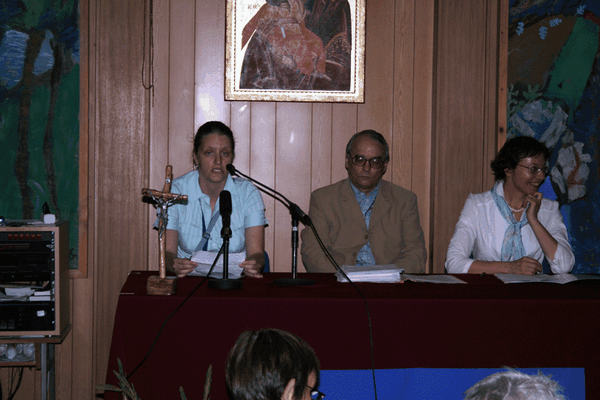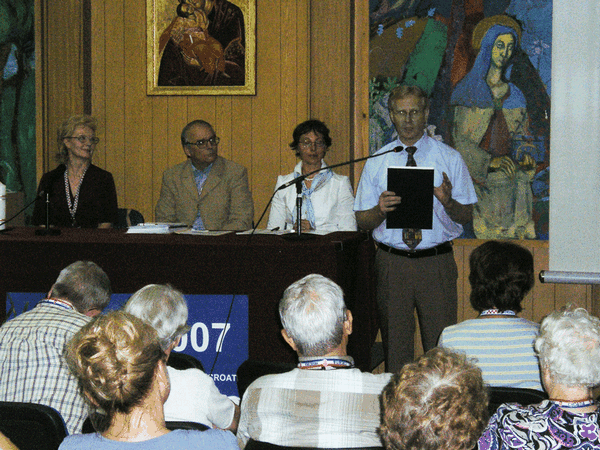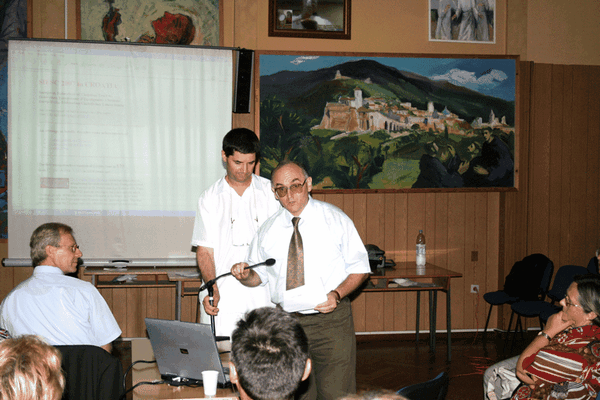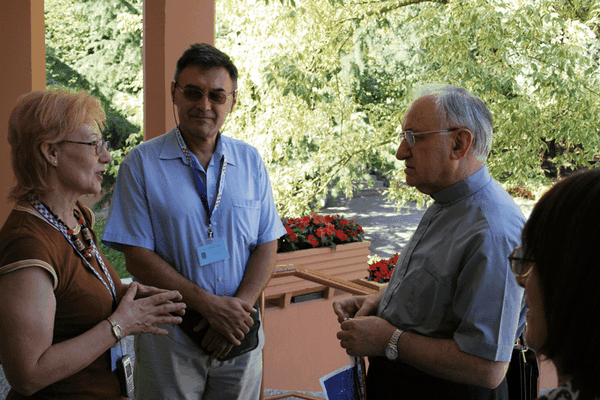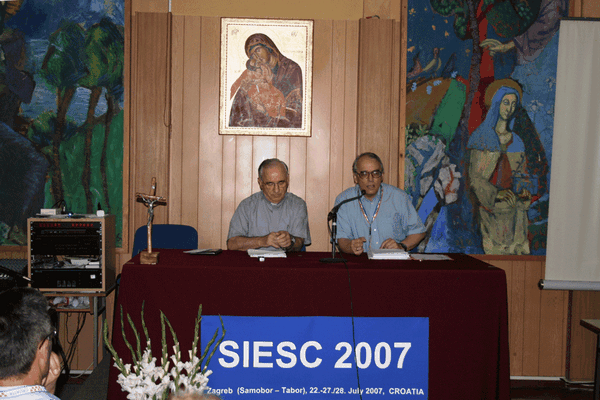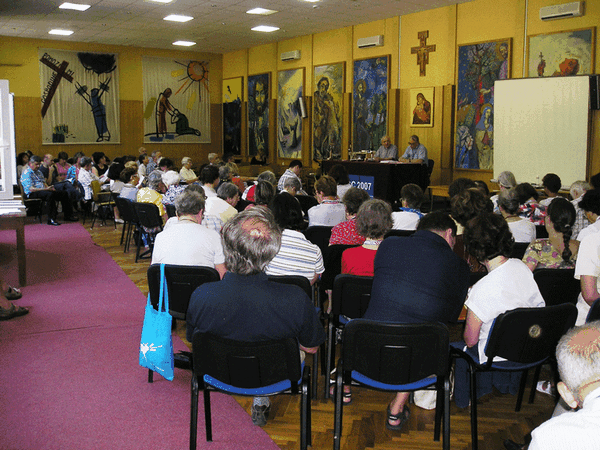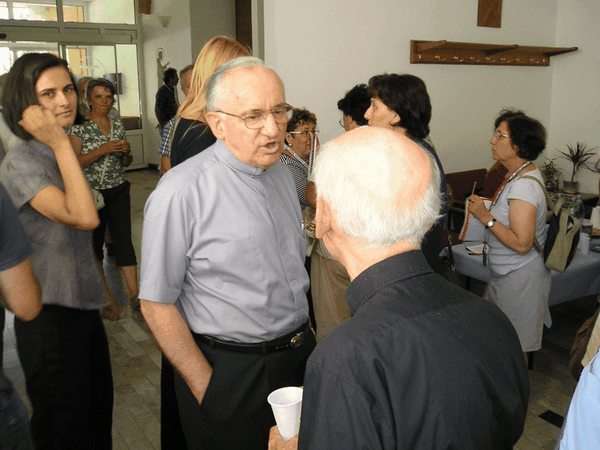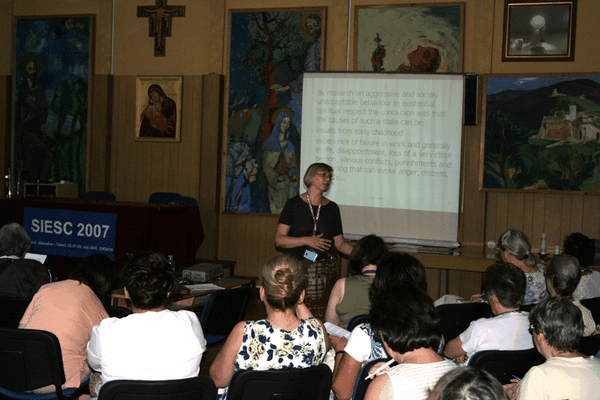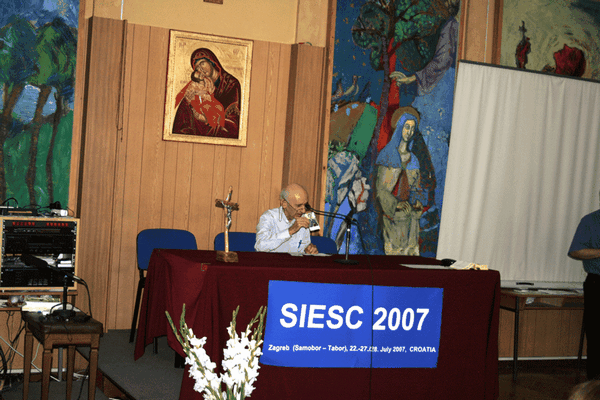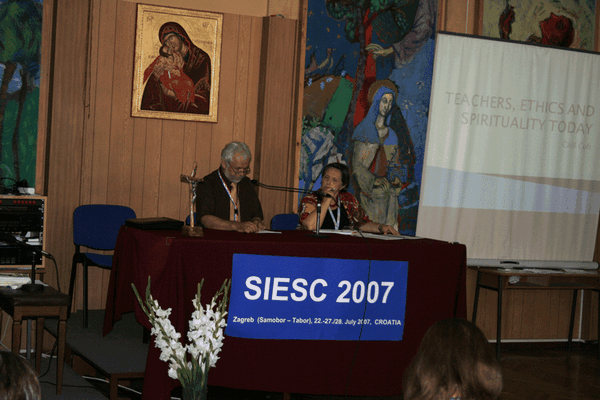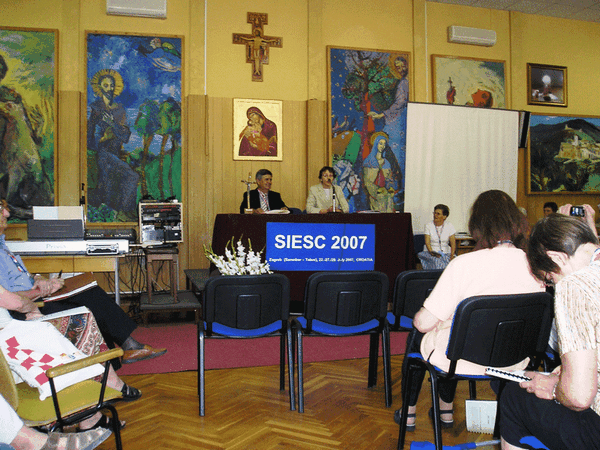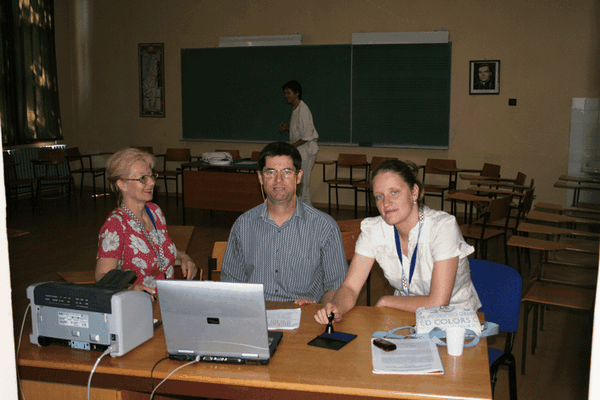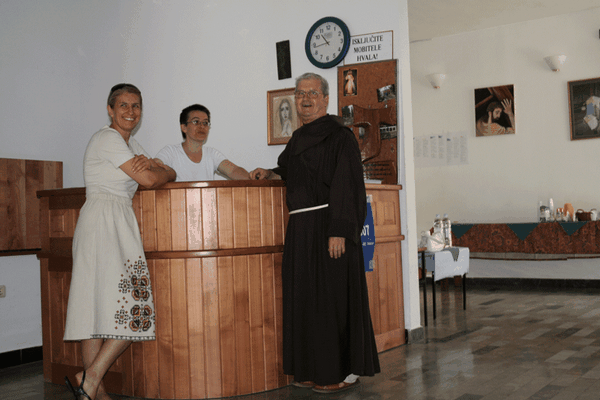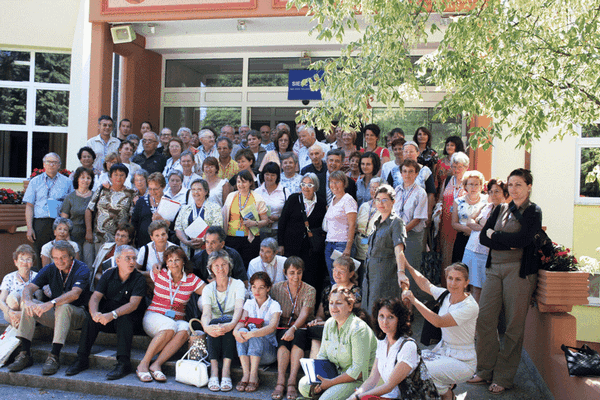THE RESPONSIBILITY OF EUROPEAN CHRISTIAN TEACHERS FOR THE WORD WITH RESPECT TO THE ENCOURAGEMENT OF SPIRITUALITY
Prof. Pero Pažin
Introduction It is an honour and a joy to me to participate in this meeting. It's an honour because teachers of European countries are present, teachers who are responsible for the education and formation of our children and our youth. It's a joy and responsibility for me, because I especially have the intention to talk about our responsibility for the word with respect to the encouragement to Christian spirituality. The following remarks are a variant of the talk contained in the frame of a comprehensive programme on Prevention of aggressiveness at school and in the family, prepared by the Croatian Catholic Teacher's Association (HKDPD). In that programme, which was acknowledged and financed by the Ministry of Science, Teaching and Sports of the Republic of Croatia, about 3500 teachers, headmasters and headmistresses, counsellors and parents were involved in their further formation. The remarks consist of two parts: 1. From the conception to the vocation of a techer; 2. our responsibility for the word.
I. 1. From conception to the vocation of a teacher
The preparation for the role of parents already started with the conception of our parents and grandparents. And the preparation for the vocation as a teacher already starts with the conception of teachers of our teachers! Therefore we are heirs to our biological and spiritual forefathers, i.e. of everything good and everything evil. The world did not begin to exist with us and will not end with us. Everything is passed on. Each of us has the chance to decide for this or for that. We can decide, if we want to be rooted in a Christian or in some other value system. We can decide to teach the youngsters according to our Christian roots or to leave these roots unmentioned, as it is the case e. g. in the European constitution. Aren't we Christian teachers ultimately responsible for that?
2. Cleaning the memory
Is there anybody among you who has not washed, not brushed his/her teeth, not taken a shower in the morning? Is there a lady who has missed using at least a little make-up? Are there men who have not shaved or trimmed their beard? Haven�t we put on nice clothes? Wasn't it important for us what our lodging here will be like? Why that? That's the way it should be. We express our respect. We create an image of ourselves. Is there anybody who did not drink coffee or tea in the morning? Is there anybody who did not have breakfast? And that�s how it is from day to day: we eat, care for our outside appearance ... And what about our mental hygiene? What about our emotional cleanliness? And finally what about our spiritual renewal, about our spiritual life? Do we regularly do what every human being should do and must do every day? It is primarily important to clean oneself, to wash emotionally, to be refreshed spiritually. Only then we are ready to encounter our fellowman, our colleague, our pupils.
3. From pupil to teacher
I ask you to stimulate, to clean your memory of all negative things. First we want to experience ourselves as pupils and only after that look at us as teachers. For that your cooperation is necessary.
Be conscious that God holds us in his hands. He loves everybody who wants to be of a pure heart. Therefore don't be afraid: whether you are clean or dirty, awake or suspicious. Many have entered these paths on earth before you, somebody has made the path even for all of us by doing good. "Don't be afraid, you are not alone!�" - a well-known song says. For others you are a present, others are a present for you. Numerous abilities and skills have been given to you: bodily, psychic and mental qualities. You have been provided with natural, but also supernatural talents: the meaning of life has been given to you as a present.
Make your way to the first form together with Jesus, to the first day of your school attendance. You were anxious and fascinated at the same time. Joy and tears alternated several times. There were sometimes insults, even injuries: harsh words, debates, even boxes round the ears. Wrestling, bad marks, punishments happened as well. I remember my higher classes, too. I took leave of my form master/mistress. Tears were flowing, too. Every leave-taking is like every birth: full of pain. And then new teachers throughout! Instead of one teacher suddenly several faces, new subjects, quite a lot of new difficulties! I became a number in the register. There followed more home exercises, again and again bad marks, warnings, punishments, prohibitions, quarrels. Puberty broke in with full power. Resistance made itself felt, every day one and the same. I had to be the best. That was enormous stress. I was afraid and did not know if I should play truant or be rejected by my mates. Nobody made an effort of understanding me. Only good achievements, excellent achievements were demanded, marks I mean, of course; what I felt during all that, what happened to me inside � nobody cared about that. I was often lonely, sad, I cherished such a lot of wishes, awfully little was really fulfilled. Though a lot of wishes of some friend were fulfilled, he was dissatisfied in spite of that. But nothing seemed to succeed with me: everything went wrong, I rather didn't like school, I played truant, more and more often I was involved in bashing, bad marks and a lot of unexcused lessons resulted in being beaten by my father frequently. All that did not help in the beginning. Things only went downhill, worse than ever before. Nobody wanted to understand me. The teachers plagued me. Witches and ghosts they were for me. And what should I do after all that, how should it go on at all? Of course, nothing is left to me apart from excusing in all directions, apart from forgiving. Was it really possible to live through all that, to survive all that? I apologize to everybody, I am reconciled with all fellowmen surrounding me. Neither consciously nor unconsciously do I want to be resentful.
And finally the last form to finish my primary education. I have arrived at choosing my future career. I imagine applying at the best secondary school, showing everybody that I am somebody, that I want to be successful. The pain of choice! Application and all the difficulties connected with it. Tension cannot be avoided. Hidden fears, but also delight - everything is there. I rise against authority. I see myself as the centre of the world. I test everything, everything can be done. So I pass secondary school. At last the leaving exam! I decide: I want to be a teacher! I will be better and more just than my teachers were. I begin my studies, I am registered. I imagine being free, that everything is open to me now: cinema, disco, parties, missed lectures, deadlines not kept, long years of studying, sometimes shortcomings and deviations. Values of the family and Christian values slowly get lost. God was nearly dead in me, I was very near to thinking he had never been. In spite of that I was dissatisfied: I was searching for the meaning of life, attended several lectures and discussions, took part in Bible circles and prayer groups, read quite a lot of books. There were sometimes moments of delight, but rather often moments of disappointment.
And now I had reached the end of my formation. Though I sinned, though the others also were wont to do that, I didn't give up, I could succeed. My life neither depended on my proceeding nor on the behaviour of my fellowmen. A certain Somebody could after all write straight on crooked lines. My whole life was kept in His hand. That's why I am very grateful to Him for my parents, my teachers and professors, my friends. I thank them for everything they did for me. I forgive them everything they did wrong, everything they did not do. I think they did their very best that they were able to do. Finally I became a teacher. I started looking for a workplace. During communism I did not fit in that job ideologically. Application and negative answers characterized my everyday life. But one day the time came, I started working in a school. Now I was in the place in which I had been watching my own teachers for sixteen years. Before me pupils were sitting, these pupils had now been trusted to me. I was responsible for them. Now I had a chance to realize my own ideals: to be better and more just than my teachers; to teach better, to educate more thoroughly. Did I really do that? Slowly I forgot that I, too, was once a pupil. Up to thirty pupils were sitting in front of me and behaved exactly as we did, the pupils of yesterday, with only the one difference that they seemed to be still less satisfied, even unhappier. We had just swapped roles. I remember my first day as a teacher very well and recall Jes�us' words:
Woe to you lawyers also! For you load men with burdens hard to bear, and you yourselves do not touch the burdens with one of your fingers. (Lk 11,46)
Indeed great burdens are heaped on the pupils. Every teacher thinks, his/her subject is most important, the pupil should know everything that is contained in the curriculum and still much more beyond it; we make high demands on them, just as once only good performance was expected of us, when we ourselves couldn't fulfil such expectations satisfactorily, either. We forget much too quickly that pupils are neither numbers nor machines, as they are first of all persons. Some of them have so to speak no name, although they would expect us to know them to a certain degree. I keep forgetting too easily that I was a pupil once myself, that I had difficulties sometimes myself.
On the other hand I have also been humiliated as a teacher. Pupils show little respect to me, parents underestimate me, inspectors supervise strictly, employers pay much too little. My ideals dating back to my youth are threatened seriously. I begin doubting my vocation as a teacher. I sometimes even toy with the thought of �fleeing� from school, while generally still cherishing the wish to be a good teacher. A well-known priest once gave spiritual exercises for priests on the topic vocation to priesthood. The exercises lasted one month, and the motto was: "You can't become a priest, if God has not granted you the vocation." Short talks, long units of keeping silence! At the end an elder priest became awake and asked: "Reverend, what are we to do who have found out that God has not granted us the vocation to priesthood?" The priest answered: "Pray to God that he may grant it to you belatedly.� Did I as a teacher detect and accept my vocation to being a teacher? Can I say: I accept my vocation to being a teacher, I accept it fully and wholly, I am happy that such a responsible task was trusted to me, being teacher and educator, that I have the honour to encourage to Christian spirituality. Or shall I pray to God that he may grant me the vocation to being a teacher belatedly, so that I can realize my vocation as well as possible? Just as my life never depended on other people, the lives of my pupils don't depend on me at all. Nevertheless I am responsible for every spoken word and for all its reverberations.
II. 1. Are we responsible for the word?
Speaking about the responsibility for the word is an obligatory endeavour rich in responsibility. "He who makes no mistakes when speaking, is perfect," a clever man once said. Why is that so? For by means of the word information is passed on. By means of the word we bring quiet and peace, but also unrest and sorrow. We encourage goodness, but we also stem it. We build up, but we also destroy what exists. By means of the word we heal, by means of the word we also cause serious injuries. We praise with words, but reproach is also expressed in words. A good word can be an excellent praise, but also a cruel punishment. It is important how we think, because thoughts manifest themselves in words. It is, however, especially essential what kind of words they are, because words become deeds, works. And deeds, if we often make them come into existence, become our habits. Habits ultimately constitute our character. Thoughts, words and works are also transferred to other people: to our pupils, our colleagues, parents of our pupils etc. And what about the responsibility of us European Christian teachers concerning that?
2. Our everyday talking
Nowadays there is a lot of talking. You talk in the family, at church, at school; there is especially much talking in the media. You could, as it were, speak of an avalanche of talking. There is a lot of talking, but we listen to one another less and less, we hear one another more and more faintly, we understand one another worse and worse, and we encounter one another in conversation less and less often. How do we think the word at all? How do we read the word? How do we prepare pronouncing certain words? Do we do that full of responsibility, we who call ourselves European Christian teachers? How do we hear and understand the following words out of the Old Testament:
My son, be attentive to my words; incline your ear to my sayings! Let them not escape from your sight, keep them within your heart! For they are life to him who finds them, and healing to all his flesh. Keep your heart with all vigilance; for from it flow the springs of life. (Prov. 4, 20-23)
Therefore we should become aware of how powerful the word and all its effects are. It�s not a question of apostrophizing other people, politicians, journalists etc., because it is quite possible that they, too, have been partly educated by some Christian teachers.
3. "Even the knife can miss its aim ..."
When I for the first time heard the saying of unknown origin "Even the knife can miss its aim, but the word never does," I knew for sure: the word did not miss me; from that time on I began to reflect thoroughly about the word, about its power, about its effects, about pronouncing and listening to the word, with a much greater feeling of responsibility. Since that time I prick up my ears, I start searching for life-giving words, I store them in my heart, detect their lasting effects, and those are enormous and predictable. I also listen to my answer, I discover its effect and state at the end: What does not seem good to me, what I don't like, I don't say to others. 4. So that the word does not miss me ...
"Even the knife can miss its aim, but the word never does." So that the right word does not pass by you and me, so that it does not miss us, we ought to prepare ourselves, we ought to ready ourselves for listening, we ought to open our hearts and ears. We ought to be able to recognize the true word, the life-giving word we ought to receive in us. Deadly words, however, we ought to avoid. "If you hear His voice today, don't be hard-hearted!", the psalmist says.
5. The prologue of Saint John's Gospel (Jo 1, 1-9)
"Colleagues, who among you has read the Bible?" That was a question frequently put at the beginning of my studies of Croatian language and literature in the seventies, i. e. at the time of communism. Silence! Was it fear or did really nobody read the Bible? Only one nun showed her hand. It would, however, also be interesting today to examine who reads the Bible or who has possibly read it already. During two meetings of our association about ten percent of the participants answered with yes to that question. That was the decisive question at the beginning of my studies, because since that time the Bible has been interesting me both as a work of literature and as God's word. The Bible began to teach me more and more. It has changed me, it has educated me. Let's now listen to some lines which can also be found in readers for teaching Croatian of the Croatian Republic:
In the beginning there was the Word and the Word was with God, and the Word was God. He was in the beginning with God. All things were made through him, and without him wasn't anything made that was made. In him was life, and the life was the light of men. The light shines in the darkness, and the darkness has not overcome it. There was a man sent from God, whose name was John. He came for testimony, to bear witness to the light, that all might believe through him. He was not the light, but came to bear witness to the light. The true light that enlightens every man was coming into the world. (Jo 1, 1-9)
Everything, therefore, is made through the word. The word gives life, it shines in the darkness, it enables us to be God's children, it edificates us so that we become holy. We, too, use the word, by means of the word we become creative, in words we communicate something, in words we sing, pray and love ... Moreover, thanks to the word we are gathered here today. If it hadn't been for the word, we would not be here today. The word itches nicely in our ears. The word creates imaginations, it cheers us or makes us sad, it makes us happy or causes distress ... The wise human being is aware of the power of the word, that�s why he/she is responsible, too. The prophets sometimes refuse speaking on: "Neither am I a prophet nor a prophet's son," the prophet Amos says. They are afraid of the consequences, both for themselves and for the people. Many of us here will sometimes be very near fleeing from the responsibility. Somebody else ought to speak the awkward words, why should it be me? Why must we make ourselves unpopular? Everybody has a right to everything. Anything goes. True, but not everything that is allowed edificates. And God's word says: "Oh, if my whole people spoke as prophets!" Or changed a little: "Oh, if each of us spoke the truth!" But that's what we have been called to and sent out for. Though the prophet Jesaja's mouth God says: "I am jealous of each of my words and won�t come to rest till it is back again with me and bears fruit." We, too, are like God: We, too, want our words to bear fruit. And they bear fruit indeed, but according to the popular saying: "As the seed, so the harvest.�" For us teachers at school the word is the only thing left to us. That's why our responsibility towards the word has become still greater. We ought to be awake and pay attention to what we sow or what we encourage, as we will have to account for every word spoken unnecessarily.
6. Relationship to the word
You should be able to deal with the word wisely. Just as Jesus does. He honours the word, he determines it, by means of the word he defends himself, he is nourished by the word, by means of the word he heals and gives life to others. A good word is the best choice. That's why Jesus tells Martha the following words:
Martha, Martha, you are anxious and troubled about many things; one thing is needful. Mary has chosen the good portion, which shall not be taken away from her. (Lk 10, 41 f).
His word does not leave anybody indifferent. At his time people said "Never did anybody speak like this one." or: "That word is hard, who can listen to it?" If we, however, want to be called Christian teachers, we must be his disciples (his followers). Therefore our talking must be true, too, it must arouse the love to truth in our listeners. We are models for our pupils. What kind of models? We must ask: "Rabbi, what shall I do?" And he would answer: "Make wise preparations for listening to and pronouncing the word, choose good words and store them in your heart, reflect about those good words and speak out in that sense." A good human being produces only good things from a soft and good heart, an evil human being, however, takes only evil things from his evil heart. What the heart is full of, the mouth speaks of - that's approximately what Jesus says. A snake's tongue can't be hidden. What we are like, will some time become manifest clearly. "He who loves me, will keep my commandments," Jesus says. That can also be a criterion for us to see how we value our own words and what we think of other people�s words. And the word is the seed, the light, the sword, the pearl ... And if we seem to possess nothing, but possess the word, that's when we are very rich and ought to care for those riches jealously.
7. Our pronouncing the word
We have been called and sent out to pronounce the word and to teach. The offer is varied, before us are life and death, joy and suffering, happiness and unhappiness, blessing and curse. We are called upon to decide and to bear witness responsibly.
8. The word in the family
The family is the fundamental cell of education. In it the sowing of the word starts. In it the child learns the first words, and the fruit becomes visible only later. If the fruit is bad, parents ask themselves what the case is with their child. They have given everything to him/her, and what has become of him/her? They tend to forget what they said to him/her, how often they told him/her to go to hell, and then the devil came. How often did they tell him/her: "You are nothing, nothing will ever become of you." Why do they wonder about what happened to the child? Others educated their children very patiently, they blessed them, had faith and hope, and first of all prayed. And the fruit appeared. The children are our reproduction and not vice versa. They are the fruit of their parents. The responsibility of the parents is great, but we as teachers are obliged to help them, so that they are not left alone in bearing that responsibility.
9. The word at school
School is a vast arable land, and we are workers. The pupils are the soil, the words are the seed. And how do we prepare for the sowing? At the last moment we get up, we get ready hurriedly, at the last moment we arrive at school, are tired and rather often full of anger. We are angry at the weather, at the traffic in town, at our colleagues, at the ministry, and at other authorities ... And then we enter the classroom, meet the pupils, who, whatever they are like, cannot be blamed for our present state. You see: Their intuition is good, they take in everything very well and report back. And we have forgotten mental and spiritual hygiene before our arrival. There are those, too, who never forget that. They get up earlier, get ready and come first to the teachers' room, then to the classroom full of joy. They eradiate calm and seem to be salutary. They understand that in education to Christian values it is much more essential who I am and what kind of human being I am, than how much I know and am capable of. The person is more important than knowledge. Sometimes we fail anyhow, and it happens that some pupils hear their names rather seldom. The following is a true event in my family. Our son once told us: "I don't want to go to the kindergarten." We asked him: "Why not?�" "Because there they call me (by the family name) Pažin, and I want them to call me (by the first name) Ivan." After the second sports training we asked him what it was like. "It was good, the trainer knows my name," little Ivan answered. And we also say: "Just imagine, he has even remembered my name." The name is the epitome of our personality. Often I hear these words sound in me quite silently: "By your name I have called you." He who is without a name, is forgotten. How many among us are nameless, have some kind of nickname or other designation instead of it? The pupils are no machines. They need not listen to everything all the time, write down everything, know everything. I am not against knowledge, quite the contrary, but there must be something more important than knowledge.
If I speak in the tongues of men and of angels, but have no love, I am a noisy gong or a clanging cymbal. And if I have prophetic powers, and understand all mysteries and all knowledge, and if I have all faith, so as to remove mountains, but have not love, I am nothing. (1 Cor 13, 1 f.)
Interpreted in a new way that passage could run like follows:
If I taught with the capability of the very best teachers, but did not have love, I would only be a smart orator and a likeable clown. And if I knew all techniques and had tested all methods, if I possessed such a formation as to feel competent, but had not understood the way in which my pupils feel and think, it would not be enough for being a teacher. And if I had passed a lot of hours in preparation in order not to be stressed and nervous, but did not have the love and understanding for personal problems of my pupils, that would still no be enough for being a good teacher. A teacher who loves is patient, he is well-meaning. He does not make a secret of it if other human beings trust in him. He does not gossip. He is not discouraged easily. He is not indecent, for his pupils he always is rather a living model of leading a good life, about which he likes to speak. Love never ends. Programmes - they will be outdated. Methods - they will be out of fashion! Techniques - they will be abandoned! For restricted is our knowledge and we can only pass on a small part of it to our pupils. If we, however, have love, our efforts will also be creative and our influence will be embodied in the lives of our pupils for ever. And for now there are techniques, methods and love, those three. But love is the greatest among them. (Anonymous teacher on the internet)
The preparation of the seed and the soil is never good enough. Even if everything is good, there are grains that do no bear fruit. The fruitful grains don�t bear equal fruit. In Saint Luke's Gospel we read:
A sower went out to sow his seed; and as he sowed, some fell along the path and was trodden under foot, and the birds of the air devoured it. And some fell on the rock; and as it grew up, it withered away, because it had no moisture. And some fell among thorns; and the thorns grew with it and choked it. And some fell into good soil and grew; and yielded a hundredfold. (Lk 8, 5-8)
And also the media contribute to bad results by inventing and conjuring up affairs. Moreover, collaborators and employees in the media once were pupils at some of our schools, some of us Christian teachers were their teachers, as it will happen again and again tomorrow.
10. Talking in love
If we have heard now that "even the knife can miss its aim, but the word never does", if we have understood what great power the word can have, how effective its achievements are, how great the responsibility for every spoken word is, what are we to do? Are we to be silent? How could we do that, if we have been called and sent out to speak, to teach, but also to bear witness by our lives: to love ourselves and in the same way our profession, our colleagues and especially our pupils? We are to teach, but should also be ready to be taught quite often. We must listen to the word, search for the best word, save the good words in our heart, be thirsty and hungry for good words, store them in all our rooms and wait for the time of sowing. We are to love all those to whom we speak: pupils, colleagues, parents, headmasters and headmistresses. A preacher told me once: "I have been asked to give a sermon. Yet I don't know what to say." I answered spontaneously: "Look at the people with love, and you will have what you need." He told me later that it was good so.
A word spoken in love reaches the heart. Words spoken without love only reach the ears. A word spoken in love attracts us, penetrates us and delights us. It prevents, removes and heals aggressive behaviour. It encourages, heals and gives life, it wakens, stimulates, educates to Christian values. There is, however, some other kind of "pedagogues", calling listeners "idiots" into whose heads one "must drum the necessary things". They say, the listeners don't know anything anyway, because they understand nothing. We are no idiots here. We look at one another, listen to one another, we experience something, we pass judgements ... We search for the word destined for us. We pay attention that our word does not pass us by. It is not always possible to hear every word and to make no mistake in speaking. Therefore every word should be chosen and pronounced responsibly, because thus we will make as few mistakes as possible. However much attention we pay, it is impossible to avoid all mistakes, but we should not be afraid if we speak in love, for "love writes straight on crooked lines" (Portuguese proverb). "Love and do what you will!" (St. Augustine)
11. Conclusion
What are we to do? From whatever we heard during these days the following conclusions result: - Mental, emotional and spiritual hygiene should be realized every day, i. e. the memory should be freed of everything negative. It is necessary to reconcile with all human beings surrounding us, to forgive everybody. It is important to examine ourselves every day: How did I think, feel, and speak, what did I do?
- It is necessary to think, speak, do only good things.
- It is necessary to accept, live, bear witness for Christian values.
- It is necessary never to assume that we are powerless, because we are God's children and heirs to his salutary grace.
- It is necessary to know that the word can release, prevent and heal aggressive behaviour.
And finally: Let's not forget that "even the knife can miss its aim, but the word never does." I hope, dear friend, that my word has not passed you by, that it has not missed you as its aim, but has found its place in your heart.
(Translated from Croatian into German by Sead Muhamedagić, into English by Wolfgang Rank)
|






